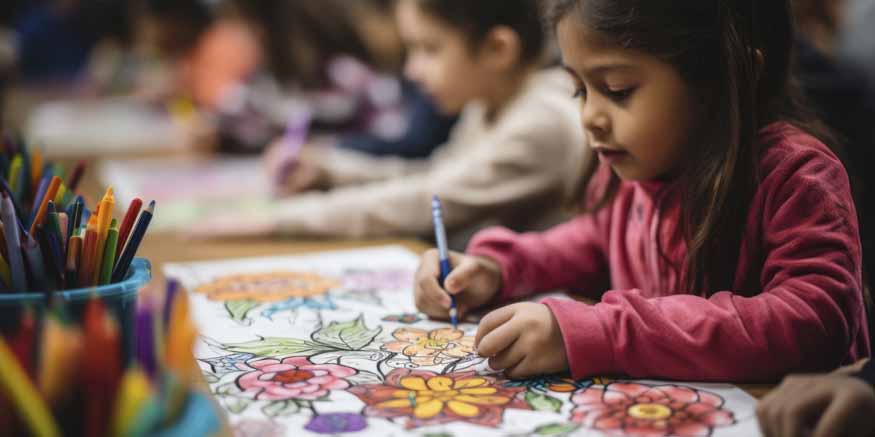The Right Age To Join Preschool: Everything Parents Need to Know

Finding out when a child is ready to start preschool is very important for their growth. Children usually begin preschool between the ages of three and four. Children gain independence, social skills, and basic motor abilities at this age. This makes the time perfect for organised learning settings.
On the other hand, preschool admission age might differ depending on personal maturity. The capacity to express demands, follow directions, and handle basic self-care duties are examples of signs. Talking with teachers and considering your child’s personality will help you make the best option. A key to a child’s easy entry into the world of education is to make sure they feel confident and excited about this new experience.
When is Your Child Ready for Preschool?
Choosing when their kid should start preschool or nursery may be hard for any parent. It makes perfect sense since, as parents, you always want to provide the best for your kids. The minimum age for nursery admission is at least 2.5 years old. This practice does not imply that all children may start preschool at this age. Everybody wants a quick fix to this common problem that all parents face at some time in their lives. But it’s important to know that age isn’t the only thing that decides when a child is ready for preschool. Every kid develops socially, emotionally, and physically in a unique way. Because of this, all factors for nursery admission age should be carefully thought through.
Signs Your Child Is Ready for Preschool
Starting preschool is a big step in a child’s growth that isn’t mainly affected by their age. If your kid shows a mix of these growth signs, they are likely ready for preschool:
- They are Potty Trained – Potty training is necessary for admission in many preschools. Preschoolers should also be able to do basic self-care tasks. It includes hand washing, zipping their pants, and putting on their shoes and coats. Potty training before preschool is not needed for children three years of age and above in some schools. If your kid gets into an accident or needs help cleaning up, don’t stress. This is not uncommon at this stage!
- They Can Handle Separation – When deciding if your kid is ready for preschool, there are many emotional things to consider. The main one is having the ability to say goodbye to a parent without being too nervous. Although it’s normal to be nervous, children who cry all day after being taken from their parents probably won’t be prepared for a complete preschool course. Many children cry on their first day or have emotional ups and downs over the first week. These emotions usually pass with time. A preschooler who is emotionally ready will be excited to learn and meet new friends.
- They Follow Directions – Preschoolers have to be able to follow the basic rules. Many preschools don’t have many strict rules. However, other courses require the kids to tidy up after themselves, follow break rules, line up with their peers, and do other random tasks. You can start teaching your kid simple skills at home if you believe they could have problems with any of these needs. Some ideas include helping to prepare the table for dinner or joining you to get the mail.
- They Communicate Clearly – People don’t expect three-year-olds to speak perfectly. The majority of preschoolers only use three to five-word words when they talk. Your child should be able to communicate well, however, so that people can understand them. It’s important that they can get their emotions and needs across. It can be done via voice, sign language, gestures, or the use of technology.
- They can Follow a Routine – Preschools often follow a fixed timetable. They could go from carpet time to playground to snack time, for example. It’s important that your kid can adjust and go easily from one activity to the next. If your kid struggles to change, maybe because they are too involved in a favourite activity, you can work with them on these skills.
- They Interact Well With Other Kids – It’s useful to take note of how well your kid gets along with other children. If they’ve spent time with other children, you’re surely aware of how they interact with others their age. Watch how they play with their siblings, relatives, or neighbours. However, a lot of preschools support the development of social skills by promoting group activities like storytime, crafts, and playgrounds. So, you can be sure that your child will have the chance to socialise with other kids their age at preschool, even if they haven’t had much opportunity to do so.
How to Prepare Your Child for Preschool?
When it comes to preparing your child for preschool, you won’t usually need to do anything. Most children learn these skills naturally between the ages of three and five. Before putting them in a preschool, you might get them ready by going over basic preschool skills. Some of them follow the rules, use the restroom, wash their hands, and interact with other children. This is especially true if you see that they are falling behind on any of these skills.
Choosing admission at a nursery age for your kid is important for their growth and development. Children who have reached the age of three or four are usually prepared for preschool. They have gained important social, emotional, and mental skills. Making sure your kid joins at the right age will help them develop a love of learning and make their move to formal education easier. Consider your child’s ability in light of their unique development and stages.
To ensure that your kids enjoy learning, enrol them at Billabong High International School. The main goal is to ensure a happy and fulfilling schooling experience that encourages a passion for learning for the rest of their lives.








